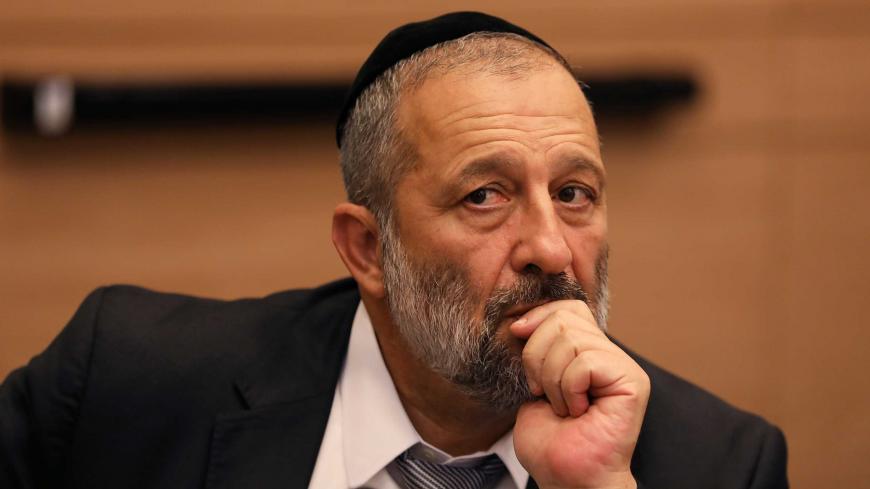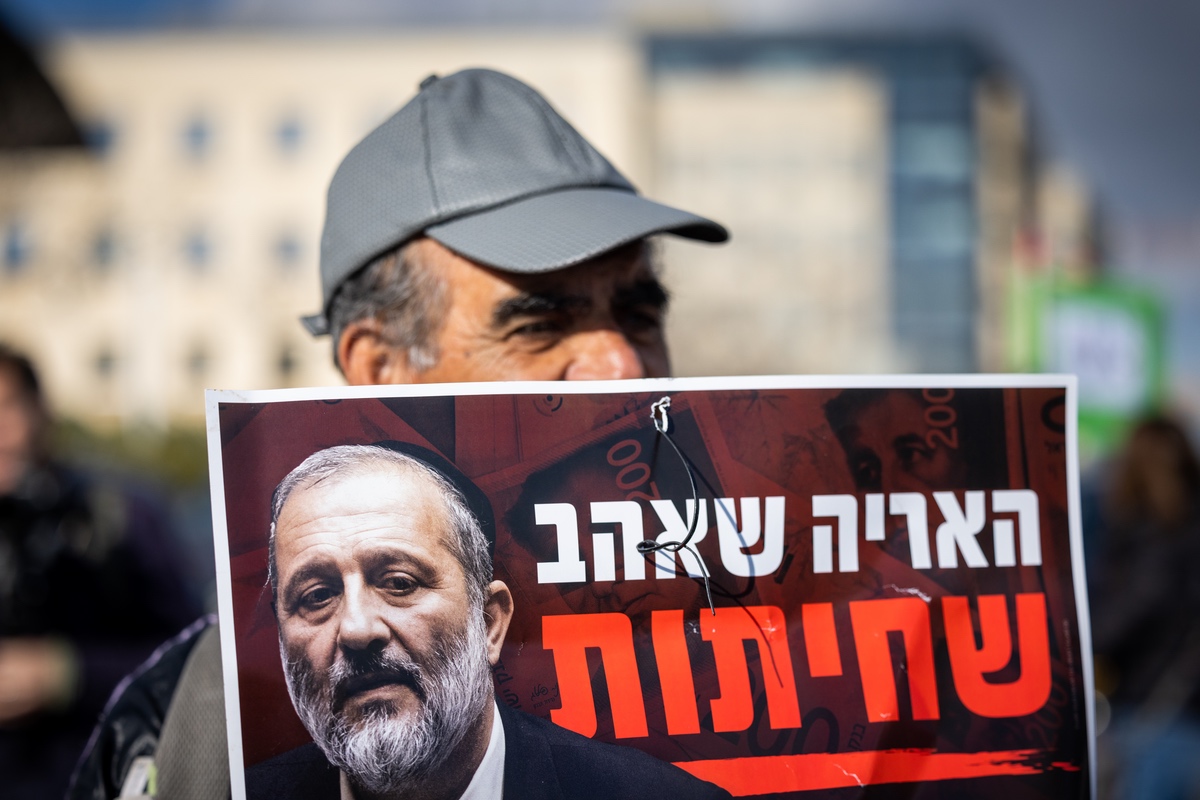The Crimes of Aryeh Deri
How a rabbinical and political prodigy became one of Israel’s most controversial and divisive national leaders.
Israel Today
January 20, 2023
 Aryeh Deri rose fast through Israel's political ranks, and then proceeded to fall just as swiftly.
Aryeh Deri rose fast through Israel's political ranks, and then proceeded to fall just as swiftly.
Aryeh Makhlouf Deri, the most dominant chairman of the ultra-Orthodox political party Shas in recent years, is among the most controversial of Israeli politicians. This week the Supreme Court in Jerusalem determined that Deri can no longer serve as a government minister in the State of Israel. The ruling was based on his past convictions on charges of tax fraud, bribery and breach of trust, for which he served several prison terms.
That legal ruling could shape the future of political life in Israel. Deri will remain a member of Knesset, but will be forced to leave his positions as Minister of Health and Minister of the Interior.
A brief history of Aryeh Deri
Deri immigrated with his family to the State of Israel from Meknes, Morocco when he was 9-years-old. The family settled in the city Bat Yam just south of Tel Aviv. Deri’s parents sent him to study at a religious school, but he had trouble acclimating and dropped out after just a month. Six months later, Orthodox activists supporting new immigrants convinced Deri’s parents to send him to an Orthodox yeshiva that would ensure that their children learn Torah in good company.
Aryeh Deri began his political career early in life. He was ordained a rabbi before the age of 25, and at the age of 26 was appointed Secretary General of the Shas Party. At just 27 years of age he was appointed Director General of the Ministry of the Interior.
At the age of 29, Deri became the youngest appointed minister in the history of modern Israel when he was made Minister of the Interior in December 1988.
During these years Deri’s popularity grew, and he received regular and extensive media coverage. More than once, Shas under Deri played a “kingmaker” role when the major political parties Likud and Labor were at a deadlock following national elections. This greatly increased the political power of Shas, and Deri was widely credited, bringing him to the peak of his political career.
But then the police investigations began.
In 1990, during a coalition crisis that eventually dissolved the unity government, news circulated about Aryeh Deri’s involvement in crimes against the state. Following the publications, police complaints were filed against Deri, which led to a police raid on the Ministry of the Interior in June 1990, during which documents were seized that confirmed the suspicions.

Aryeh Deri’s crimes
Deri’s investigation lasted three years (1990-1993) during which time he continued to serve as Minister of the Interior. In the interrogation rooms he would maintain his right silence. Deri’s conduct during the police investigations drew a lot of public criticism. The suspicions against him that arose due to the publications in the press eventually coalesced into two criminal cases called “the personal case” and “the public case.”
As part of the “personal case,” Deri was suspected of having received a bribe of $150,000 from members of the “Lev Habanim” yeshiva during the years 1984 to 1990. According to one of the state’s witnesses in the case, Deri knowingly asked the treasurer and head of the yeshiva to transfer the money to his and his wife’s private account. The aforementioned money was then used by the Deri couple to buy a house in Jerusalem and travel abroad. In exchange, Deri was supposed to promote favors to the yeshiva.
In addition, Deri was accused of trying to cover up the bribery case when he opened a fictitious association whose purpose was to qualify the funds transferred to his personal account.
As part of the “public case,” Deri was accused of transferring money as the Interior Minister to ultra-Orthodox bodies established by the Shas party. Deri maintained that he was promoting affirmative action to combat ongoing discrimination suffered by the Orthodox Sephardi community. It is important to note that the party headed by Aryeh Deri, the Shas Party, is a party whose goal is to restore the dignity of Sephardic Jewry.
More crimes and a culture war
Shas is a party of (Jewish) Sephardim who keep the traditions. In the early years of the State of Israel, there was cultural, religious and social discrimination against Sephardic and Mizrachi (Eastern) Jews who immigrated from Arab countries and the Balkans. There was a clear preference for Ashkenazi culture, which was considered a high culture, while the Sephardic culture was not considered a culture at all by the Ashkenazi immigrants. Shas unites Orthodox and traditional non-Orthodox Sephardic Jews.
Eventually, in March 1999, the District Court in Jerusalem convicted Deri as part of the “personal case” on one charge of bribery, three charges of fraud and breach of trust, and for receiving something fraudulently under aggravating circumstances. He was sentenced to four years in jail, but an appeal to the Supreme Court reduced that to just one year after it was determined Deri had received only $60,000 rather than $150,000.
The decision caused outrage among the Sephardi Orthodox, and Rabbi Ovadia Yosef, the spiritual leader of Shas, declared that Deri was innocent.
In that year’s Knesset election, Shas won 17 seats, a record that has not been broken to this day. Despite having declared Deri to be innocent, Rabbi Ovadia Yosef was forced to fire him from the leadership of Shas as part of the coalition agreements.
In September 2000, Deri entered the Ma’asiahu prison, and was released two years later after having his prison term shortened for good behavior. Deri immediately returned to court to face an expedited trial in his “public case.” He was convicted on one charge out of five – for transferring 400,000 shekels to an association headed by his brother. For this, Deri was sentenced to three months of probation and a fine of 10,000 shekels.
In 2012, Deri returned to Shas and Rabbi Yosef placed him second on the party list. A year later he was again appointed chairman of the party.
In 2016, the Attorney General opened a criminal investigation following suspicions of prohibited real estate transactions in which associates of Deri were involved.
In 2018, the police recommended filing an indictment against Deri for fraud and breach of trust, as well as tax evasion and money laundering.
In December 2021, a plea agreement was reached in which Deri admitted to the charges, resign from the Knesset and paid a fine of 180,000 shekels.
Two months later, the Jerusalem Magistrate’s Court approved the plea deal and added 12 months of probation to Deri’s previous sentence. Judge Shmuel Herbst noted that “the defendant, a public figure for many years, now voluntarily withdraws from engaging in public affairs.” The next day, Deri was appointed an adviser to the Shas party in the Knesset.
In the elections for the 25th and current Knesset, Deri was again appointed head of the Shas list, which won 11 seats. But on January 18, 2023 the Supreme Court ruled that Deri had failed to honor the plea deal in which he agreed to leave political life. As a result, the court ruled that Deri cannot serve as a minister in the coming years.
No comments:
Post a Comment